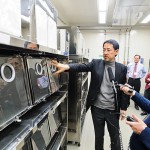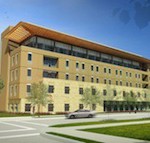Tag Research
UW-Madison launches Microbiome Initiative
Recent studies have shown that the complement of microorganisms known as the microbiome is an important determinant of human health and disease.
Byzantine skeleton yields 800-year-old genomes from a fatal infection
Researchers discovered extraordinarily well preserved microfossils — mineralized ‘ghost cells’ — that closely resembled bacteria from the genus Staphylococcus.
More frequent hurricanes not necessarily stronger on Atlantic coast
Active Atlantic hurricane periods, like the one we are in now, are not necessarily a harbinger of more, rapidly intensifying hurricanes along the U.S. coast, according to new research performed at the University of Wisconsin–Madison.
Immunotherapy team harnesses cellular systems to fight diseases
A dedicated army of UW–Madison researchers is perfecting how to use immunotherapy and searching for new ways to do so.
Fossil fuel formation: Key to atmosphere’s oxygen?
“Why is there oxygen in the atmosphere?" asks researcher Shanan Peters. The high school explanation is 'photosynthesis.' But we’ve known for a long time ... that building up oxygen requires the formation of rocks like black shale."
Heat-activated penile implant might restore sexual function in men with E.D.
Brian Le, a UW urologist with a background in materials science, estimates that the device — if it continues to reach its research milestones — could come to market in five to 10 years.
Ocean temperatures faithfully recorded in mother-of-pearl
Mother-of-pearl or nacre (pronounced nay-ker), the lustrous, tough-as-nails biomineral that lines some seashells, has been shown to be a faithful record of ancient ocean temperature.
Report shows much room for improvement in Wisconsin’s health
The report by researchers at the UW Population Health Institute gives Wisconsin a grade of B– for overall health, and warns that we are falling behind other states.
Novel catalysts improve path to more sustainable plastics production
The second most-produced organic chemical in the world, propene is a key component of plastics found in consumer goods such as electronics, clothing and food packaging.
Magnetic brain stimulation can bring back stowed memories
The lab of Brad Postle, a psychology professor at UW–Madison, is challenging the idea that working memory remembers things through sustained brain activity.
Study shows many lakes getting murkier, but gives hope for improvement
While water clarity in most Wisconsin lakes has not changed in 20 years, researchers say the fact that more lakes are getting worse signals there is work to be done.
Food scientist aiding fuel ethanol with new engineered bacteria
James Steele’s new company, Lactic Solutions, is advancing a judo-like remedy: using genetic engineering to transform enemy into friend.
Cancer signaling pathway could illuminate new avenue to therapy
The study could establish new avenues of therapeutic treatments for many types of solid tumors.
Nurses keep hospital patients moving with help from UW researchers
UW–Madison School of Nursing researchers set out to get hospital patients on their feet and walking — movement that could drastically change the shape in which they leave the hospital. They found success in a 13-week pilot study with the help of nurses in a unit at the University of Wisconsin Hospital in Madison.




















